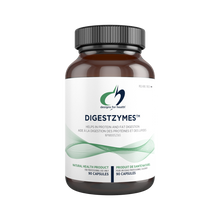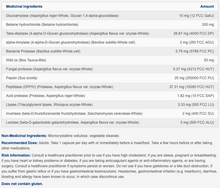
- Comprised of a blend of digestive enzymes along with betaine HCL to support optimal digestion of proteins, fats, and carbohydrates.
- Aids in the breakdown of casomorphin (from casein) and gluteomorphin (from gluten).
- Helps lactose intolerance. Contains the enzyme lactase, which helps break down the dairy sugar lactose.
- Helps lactose intolerance
- Comes in 90 or 180 capsule bottle
The use of Digestzymes™ before meals may be helpful when patients experience gas and bloating after eating, constipation, or a feeling of fullness after eating only a small quantity of food.
Role in Inflammatory Disease
Proteases are important in preventing tissue damage during inflammation and in the formation of fibrin clots. Fibrin promotes inflammation by forming a wall around the area of inflammation that results in the blockage of blood which leads to swelling. Fibrin can also cause the development of blood clots that may dislodge and produce strokes or heart attacks.
Role in Food Allergies
Individuals who do not secrete enough proteases suffer from multiple food allergies. Failure to digest food allows for large molecules of the undigested food to be absorbed and cause such problems as food allergies, colitis, and immune system weakness. Proteases are essential in preventing the deposit of immune complexes in body tissue. Protease enzymes are effective in reducing circulating immune complex levels in patients with autoimmune disease. Undigested food also allows yeast organisms to thrive. Thus, those with Candida Albicans may benefit from Digestzymes™ supplementation with their meals.
Role in Weight Loss
Digestzymes can also be an important adjunct to assist with healthy weight management. Improved digestion results in better absorption of nutrients, which may enhance production of cellular energy and boost overall metabolism, thereby aiding weight loss. Additionally, better digestion of food allows for faster bowel transit time and more frequent bowel movements, both of which aid weight loss.
Medicinal Ingredients
Glucoamylase (Aspergillus niger-Whole, Glucan 1,4-alpha-glucosidase): 10 mg (12 FCC GaIU)
Betaine hydrochloride (Betaine hydrochloride): 200 mg
Taka-diastase (4-alpha-D-Glucan glucanohydrolase) (Aspergillus flavus var. oryzae-Whole): 26.67 mg (4000 FCC DP)
alpha-Amylase (4-alpha-D-Glucan glucanohydrolase) (Bacillus subtilis-Whole cell): 2 mg (250 FCC ADU)
Bacterial Protease (Bacillus subtilis-Whole cell): 5.79 mg (5788 FCC PC)
Wild ox (Bos Taurus-Bile): 50 mg
Fungal protease (Aspergillus flavus var. oryzae-Whole): 5.27 mg (4212 FCC HUT)
Pepsin (Sus scrofa): 25 mg (250000 FCC PU)
Peptidase (DPPIV) (Protease, Aspergillus flavus var. oryzae-Whole): 37.31 mg (10260 FCC HUT)
Acid protease (Protease, Aspergillus niger-Whole): 1.82 mg (10 FCC SAP)
Lipase (Triacylglycerol lipase, Rhizopus oryzae-Whole): 3.33 mg (500 FCC LU)
Invertase (beta-D-fructofuranoside fructohydrolase, Saccharomyces cerevisiae-Whole): 2 mg (400 FCC SU)
Lactase (beta-D-galactoside galactohydrolase, Aspergillus flavus var. oryzae-Whole): 5 mg (500 FCC ALU)
Non-Medicinal Ingredients (Gluten Free)
Microcrystalline cellulose, vegetable stearate.
Recommended Dose
Adults: Take 1 capsule per day with or immediately before a meal/food. Take a few hours before or after taking other medications.
Risk Information
Consult a healthcare practitioner prior to use if you have high cholesterol, if you are obese, pregnant or breastfeeding, if you have heart or kidney problems or diabetes, if you are taking anticoagulant agents or anti-inflammatory agents, or are having surgery. Consult a healthcare practitioner if symptoms persist or worsen. Do not use if you have gallstones or a bile duct obstruction, if you suffer from gastric reflux or if you have gastrointestinal lesions/ulcers. Headaches, gastrointestinal irritation (e.g. heartburn), diarrhea, bloating and allergy have been known to occur, in which case discontinue use.
References:
1. Schubert ML. Gastric secretion. Curr Opin Gastroenterol. 2014 Nov;30(6):578-82.
2. O'Connor A1, O'Moráin C. Digestive function of the stomach. Dig Dis. 2014;32(3):186-91.
3. Morita A, Chung YC, Freeman HJ, Erickson RH, Sleisenger MH, Kim YS. Intestinal assimilation of a proline-containing tetrapeptide. Role of a brush border membrane postproline dipeptidyl aminopeptidase IV. Journal of Clinical Investigation. 1983;72(2):610-616.
4. Hausch F1, Shan L, Santiago NA, Gray GM, Khosla C. Intestinal digestive resistance of immunodominant gliadin peptides. Am J Physiol Gastrointest Liver Physiol. 2002 Oct;283(4):G996-G1003.
5. Nongonierma AB1, FitzGerald RJ. Susceptibility of milk protein-derived peptides to dipeptidyl peptidase IV (DPP-IV) hydrolysis. Food Chem. 2014 Feb 15;145:845-52.
6. Untersmayr E1, Jensen-Jarolim E. The effect of gastric digestion on food allergy. Curr Opin Allergy Clin Immunol. 2006 Jun;6(3):214-9.
7. Diesner SC1, Pali-Schöll I, Jensen-Jarolim E, Untersmayr E. Mechanisms and risk factors for type 1 food allergies: the role of gastric digestion. Wien Med Wochenschr. 2012 Dec;162(23-24):513-8.
8. Untersmayr E, Jensen-Jarolim E. The role of protein digestibility and antacids on food allergy outcomes. The Journal of allergy and clinical immunology. 2008;121(6):1301-1310.
9. Pali-Schöll I1, Jensen-Jarolim E. Anti-acid medication as a risk factor for food allergy. Allergy. 2011 Apr;66(4):469-77.
10. Trang T, Chan J, Graham DY. Pancreatic enzyme replacement therapy for pancreatic exocrine insufficiency in the 21st century. World Journal of Gastroenterology : WJG. 2014;20(33):11467-11485.








